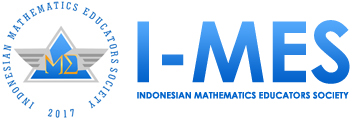Predicting Growth Rate of Students’ Achievement in Mathematics Using Mathematical Growth Model
DOI:
https://doi.org/10.35706/sjme.v2i2.1319Abstract
Students’ mathematics achievements in secondary school have an influential effect on their performance in university and their future careers. There are numerous innovative teaching strategies which are promising and have shown to improve students’ achievement in mathematics; one will wonder if there will be corresponding achievement growth in mathematics. Therefore, this paper predicts growth rate of students’ achievement in mathematics using mathematical growth model. A developmental survey design was employed where students’ WAEC mathematics achievement results from 1991-2016 were collected from the Development Division, West African Examination Council (WAEC) Lagos, Nigeria. The Logistic growth mathematical model was used to compute predicted achievement growth rate. The Statistical Package for Social Sciences (SPSS) was also used to plot the graph of the achievement data from 1991 to 2016. The result indicates that the predicted growth rate of students’ achievement in mathematics is approximately increased by 25.3% per year. This shows a weak upward trend in predicted rate of achievement at credit level and consequently indicates unsteady sustainability in mathematics achievement as well as economic growth. It is recommended among others that there should be investigation into factors responsible for the weak and unsteady achievement growth in WAEC general mathematics in Nigeria. Also, effective teaching and learning of mathematics at all levels of schooling should be ensured by all concerned in other to sustain the achievement growth in the subject.
Downloads
References
Ahiakwo, M. J. (2006). Science, Science Education and Scientific Literacy. Inaugural Professional Lecture Series No. 17, 4.
Anaduaka, U & Okafor, C (2013). Poor performance of Nigerian students in mathematics in senior secondary certificate examination (SSCE): What is not working? JORIND 11(2), 1-5.
Banks, R (1994). Growth and diffusion phenomena: Mathematical frameworks and applications. Springer, Berlin.
Bossaert, G; S. Doumen; E. Buyse & Verschueren, K (2011). Predicting students' academic achievement after the transition to first grade: A two-year longitudinal study. Journal of Applied Developmental Psychology. 32, 47–57.
Ma, X., & Klinger, D. A. (2000). Hierarchical linear modeling of student and school effects on academic achievement. Canadian Journal of Education, 25, 41-55.
Murname, R.J., Willett, J. B., & Levy, F (1995). The growing importance of cognitive skills in wage determination. Review of Economics and Statistics, 78, 251-266.
National Mathematics Advisory Panel (NMAP). (2008). Foundations for success: The final report of the National Mathematics Advisory Panel. Washington, DC, U.S. Department of Education.
WAEC Chief Examiners Report (2001-2010). West African Examination Council WAEC Report for Mathematics, Chemistry and Physics. Yaba: Lagos, Nigeria.
Wilkins, J. L., & Ma, X. (2002). Predicting student growth in mathematical content knowledge. The Journal of Educational Research, 95, 288-298.
Useni, P.F., Okolo, P.N. & Yakubu, R.M. (2012). Causes and remedy to secondary school student’s poor performance in mathematics in Awe L.G.A, Nasarawa State, Nigeria. ABACUS, Journal of the Mathematical Association of Nigeria, 37(1), 142-150.
Yeung, R. (2015). Athletics, athletic leadership, and academic achievement. Education and Urban Society, 47(3), 361-387.
Zalmon, G & Wonu, N (2017). Comparative analysis of student mathematics achievement in West African senior secondary certificate examination in Nigeria. European Journal of Research and Reflection in Educational Sciences. 5(1), 24-31.
Downloads
Published
How to Cite
Issue
Section
License
Authors who publish with this journal agree to the following terms:
- Authors retain copyright and grant the journal right of first publication with the work simultaneously licensed under a Creative Commons Attribution License that allows others to share the work with an acknowledgment of the work's authorship and initial publication in this journal.
- Authors are able to enter into separate, additional contractual arrangements for the non-exclusive distribution of the journal's published version of the work (e.g., post it to an institutional repository or publish it in a book), with an acknowledgment of its initial publication in this journal.
- Authors are permitted and encouraged to post their work online (e.g., in institutional repositories or on their website) prior to and during the submission process, as it can lead to productive exchanges, as well as earlier and greater citation of published work (See The Effect of Open Access).












